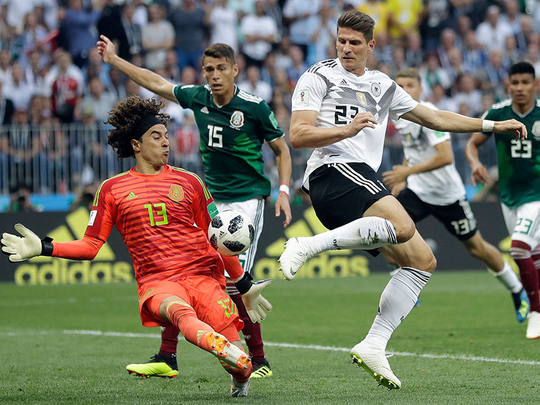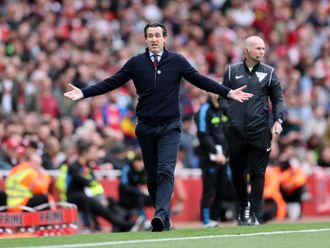
Dubai: So we have all had a chance to see every team in action at least once now, and the biggest takeaway so far for me is how the so-called minnows have turned up and the glamour boys of the ‘elite’ teams have been found wanting.
Russia — the hosts and lowest ranked team in the tournament — have had us choking on our blinis with their free-scoring, swashbuckling approach; Japan, Switzerland and Senegal have ripped up the form book; Iceland are making us fall in love with them all over again after their run to the quarters at Euro 2016.
Meanwhile, the top dogs are finding the going tough. England, Uruguay and France scraped wins against Tunisia, Egypt and Australia respectively. Argentina, Portugal, Spain and Brazil all failed to pick up the three points. World Cup holders Germany were humbled by the ever-optimistic but always underachieving Mexico. Poland and the mighty Robert Lewandowski were brushed aside by Sadio Mane’s Senegal.
Germany joined an unwanted list of defending champions who lost their opening game, alongside Spain (2014), France (2002), Argentina (1990 and 1982) and Italy (1950).
It was Germany’s first opening-game defeat since 1982 and the only time in history that they, Brazil and Argentina all failed to win their first matches.
Now that’s interesting.
As Gianni Infantino, the Fifa president, looks to expand the tournament to 48 teams, possibly by 2022, many doom-mongers have said it will lead to a watered-down event with ridiculous one-sided results like we have seen at the Rugby World Cup since its expansion to 20 teams in 1999 (New Zealand beat Japan 145-17 and Scotland defeated Ivory Coast 89-0).
But if anything, this tournament is showing how the gulf between the ‘great’ and the ‘also-rans’ is not so big, and an expanded tournament will only lay the foundations for more upsets and give smaller nations their moment in the limelight.
We all have fond memories of Cameroon wowing the world and beating the mighty Argentina in 1990, a then-unheard-of Senegal downing holders France in 2002, Algeria beating West Germany in 1982 and we still read about the United States beating England 1-0 in 1950 (I’m not that old).
It’s moments like these that make the World Cup great, and the more opportunities the Davids get against the Goliaths the better in my book.
Football and its reach is truly global these days, meaning stars are being unearthed all over the planet and access to proper facilities and coaching is improving all the time. Also, with scouts and social media doing their bit, talented youngsters are being spotted, signed and getting the chance to play in the biggest leagues against the best opposition. These factors are levelling the playing field, so to speak, meaning your Icelands and Senegals can more than hold their own against the big boys.
I guarantee there will be more upsets to come in the next fortnight before the group stages are settled.
Also, with none of the pre-tournament favourites grabbing the World Cup by the scruff of the neck, another bit of history could be in the air. The competition has only had eight winners in history. Maybe that’s about to change (I’m looking to you Belgium, Mexico and Portugal, but secretly rooting for Iceland).









